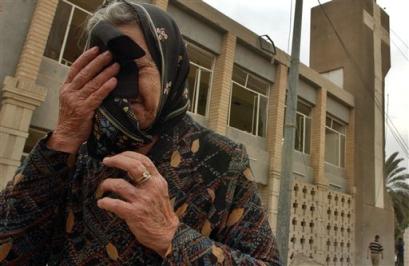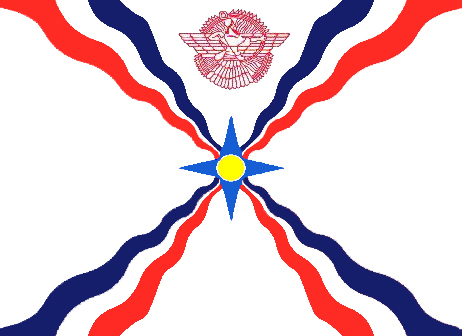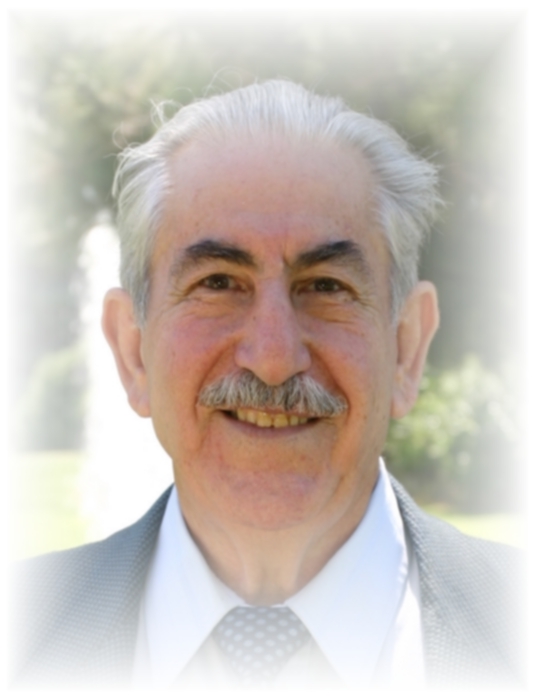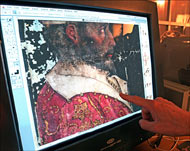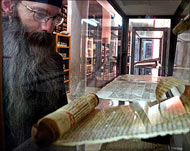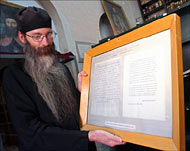Pride and Prejudice
Ann-Margaret Yonan
California
I recently read an article in Zinda entitled “The Hallucination of the so-called Moslem Assyrians”. The title was offensive, and inflammatory, and the contents of the article were full of historical inaccuracies, false assumptions, and the methodology used by the author lacked credibility, creativity and vision. I consider Mr. Fred Aprim to be my brother in oumta Ashoureta, even when his political views are not the same as mine. I therefore, will ask him to forgive me if I do not agree with his thesis.
I preface my remarks by stating that I spent the last twenty years of my life studying religions of the world. Without going into any details about the nuances of each religion and the differences between them, I can tell you that I find all of them equally fascinating and after a long search for the truth, I found that they are all the same in their message, and all are rooted in the ancient Assyrian belief system.
 |
ANTIQUARIAN ARCHAEOLOGY & SYRIAC BOOKS EXHIBIT 2005
Sunday, June 26
2:00 - 7:00 pm
at the
Assyrian American Association of Southern California
5901 Cahuenga Blvd.
North Hollywood, CA 91601
(818) 506-7577
Free to Public
Rare classic books, Bibles, Maps, Syriac books, Contemporary
History books and documents will be on exhibit.
Authors and Book vendors are welcome to participate. Free space will be provided.
Applications for upcoming AAASC's Paul Alex Youhanan Scholarships will be available. |
|
I take pride in living my life according to the teachings of our Lord Jesus Christ, who shined his light in my soul and showed me the true meaning of love, devotion, and respect for all God’s children, (irrespective of their religious beliefs) the day I accepted him as my Lord and savior. I taught my son that Jesus came to fulfill the promise of God to all his children, no matter what race, color, religion, or ethnicity. God’s promise is that he created us equal in his eyes, and that he loves each one of us unconditionally, no matter what we are or who we are. Jesus is the love of God personified in the physical as well as the spiritual form.
Jesus came precisely because of all the prejudice, hatred, and bigotry that dominated the world. He came to teach us what love and truth really is, and that is why he said “I am the way”. He didn’t say that because he wanted us to believe that only Christians will be loved by God, or go to heaven if they are kind, humble, loving, and charitable. He meant that he represents the traits and qualities he demonstrated, and it is precisely these qualities, that bind us to God. Jesus also said, “If you believe in me, then you believe in the father, for I and the father are one.” Meaning they are both love, and therefore whoever believes in love is a righteous person, and will do kind and loving deeds, and contribute to the overall well-being of the world we live in, because they will see all people as one.
Jesus never asked any of us to form a religion called Christianity. He simply said: “Follow me and I will make you fishers of men”, that it is simply not enough to be rich, famous, successful, etc. but that we need to spread the message of love to all men, wherever they are, whoever they are. Jesus sat with the thieves, prostitutes, and lepers and it was through the power of his love that he was able to heal and perform miracles.
Christians do not have exclusivity on Christ. Christ belongs to all mankind, even the people one might hate the most. Ultimately, it is those that we hate the most and are prejudiced against, that benefit from the love of Jesus. It is Jesus who sits next to a homosexual man who is dying alone of aids because he is condemned by society, and shunned by his parents, siblings, and friends for being an embarrassment and a sexual “deviant”. It is Jesus who opens his arms to the pervert that has committed the most vile act against innocent children. It is Jesus who stretches his arms to a prostitute who did not know how to feed her children any other way.
We are not capable of doing such things until we understand what love is, and how it came to us in the form of Jesus. Until then, we will continue to be bigots, hateful, prejudiced, and violent.
All religions are man-made, not God made. God loves all his children, whether they are Christian, Muslim, Jewish or Hindu, and yes, even atheist. Even those of us who do not understand the love of God can easily understand that a good Muslim who is kind, loving, tolerant, and merciful will have a place with God much more than a Christian who is hateful, bigoted, violent, and prejudiced.
The ancient Assyrians understood this concept, and built ziggurats and temples to provide a space by which all Assyrians could worship, regardless of their religious beliefs. There were many religions in Assyria, and among the hundreds of thousands of pieces of texts, sculptures, and reliefs, not one record or document shows a single individual was persecuted for his/her belief. Each worshipped God the way they knew best. In fact, the code of Hammurabi was a civil code, not a religious one. Ultimately, this code gave rise to Judaism, Christianity, Hinduism, Islam, and Buddhism. Many religions were created in Assyria and that is why one of its cities was called Babel, (Bab-El) meaning “the Gate of God”. That’s what the tower of Babel represents. We can say all religions came from one source and one place: our beloved nation, Assyria. Genesis of the Bible says: “And the people were one”. This means all the people that lived in Assyria were one: Assyrians! This is true even though today Assyria has spread throughout the world and created other cultures and religions. The late William Saroyan writes, “In a sense, everyone in the world is Assyrian.”
If the people of Mesopotamia were all one, as Genesis tells us, then Assyrians of today are Moslems, Christians, and Jews. This fact alone renders Aprim’s theories irrelevant. However, let us consider some of his statements for the reader’s sake.
Aprim writes, “If a Moslem who professes publicly that they are Assyrians, it would still be impossible for Christian Assyrians to co-exist with them peacefully.” Firstly, this statement assumes there are no Moslem Assyrians, which is inaccurate, as we have proven above. Secondly, it assumes that there are no Assyrian Christians co-existing peacefully with Moslem Assyrians in today’s Iraq. I dare someone to tell this to my aunt Joanne who recently moved to the United States after living in Baghdad for seventy years. She was a widow and lived alone in Baghdad for the last 15 years, until her recent arrival in California. It was her Muslim neighbors, that helped her with her daily needs, comforted her, protected her, and loved her like their own sister. Until this day, they are the ones she thinks of, and pines for and speaks of fondly. I dare someone to tell this to all the people of Turlock who sent their Muslim friends in Iraq money, when I was going to Iraq four years ago. I dare you to tell this to all the Shiaa and Sunni people I saw praying to the Virgin Mother inside the Assyrian Church of St. Mary, (one of the oldest churches in Baghdad). When I was at the border leaving Baghdad, my taxi driver, a Shiaa, told the border officials “shame on you if you search a daughter of this land.”
These are just some small examples of how blanket statements that all Muslims are fanatic or bad, or hateful are absurd. The same as I cannot say all Christians are bad when I attend church on Sundays and see some of the biggest liers, cheats, and bigots worshipping Jesus.
Joey Nibras |
|
Joey is Managed by
Jesters Entertainment
For Bookings Contact Vic Dunlop - 818-352-0499
or (213) 709 0859
|
|
Lastly, Aprim’s statement predicts that a Christian and a Muslim Assyrian can never co-exist peacefully, not now, and not in the future. If that is the case, then humanity’s struggle for peace is but an empty dream, and there is no hope for mankind. Most educated and spiritual beings endeavor to live peacefully side by side, and Assyrians are no exception. If we look at the prophet Isaiah’s statement, “there will be a highway between Egypt, Assyria, and Israel” one can easily understand that the three main religions of the world, (Christianity, Islam, and Judaism) will one day co-exist peacefully. The Bible tells us these people were at one time “one people” and I believe the Bible simply because I can easily understand from reading history and religious books, that it was an Assyrian who started Egypt, (a man by the name of Maneshe.) It was an Assyrian who started Israel, a man named Abraham, (Ur A HEEM-meaning “the Man, of the God of Ur”.) If the people were one, then we can be one again with minimal effort. In other words, if we are willing to set our false pride and prejudice aside, we can be one, just as God sees us as one from up above. These concepts have nothing to do with being “ultra liberal.” or “liberal nationalism”. They have to do with doing the right thing and being godly, or goodly.
The second paragraph of Aprim’s article states, “It would be much easier and less troublesome to marginalize and undermine the “Christian” Assyrians by their fellow so-claimed Moslem Assyrians. Instead of having Arab or Kurd Moslems for example, committing the oppression and persecution”. If Assyria is a secular state, and there are Moslems Assyrians, Jewish Assyrians, and Christian Assyrians living in Assyria, the chances of an Assyrian slaughtering, marginalizing, and oppressing another Assyrian would be minimal if the degree of separation between them is smaller than it is now.
In his article, Aprim further maintains that, “Being a Moslem is to have a culture based on the teachings of early Arab Moslem figures that follow strict Arab and Moslem culture. This culture was alien to north of Iraq; it came from the Arabian Peninsula”. Again, Aprim assumes that only Arabs are Moslems. When I was in India and Pakistan I did not meet a single Muslim practicing the Arabian culture. They dressed in their native costumes, cooked their native food, and spoke their native tongue. I saw the same thing in Indonesian households. Additionally, to state that the Arabian culture was foreign to northern Iraq is to deny the fact that the Arabian culture was established on the foundation of the Assyrian roots, and therefore how could it have been alien to the Assyrians of northern Iraq? These are just some of the contradictions Aprim has not addressed in his article.
Aprim postulates, “the fact on the ground in Iraq remains that Assyrians are all Christians, again with the exception of atheists here and there. If there are so-called Moslem Assyrians, where are they and have they publicly professed to their Assyrian belief and defend it? The answer is no.” Aprim neglects to remind himself and the reader that in Iraq today, there are millions of educated Iraqis who are calling for a secular government. Just ask the Reverend Kenneth Joseph. They are the people that tried to protect the Assyrian artifacts with their lives during the war and the looting campaigns, realizing these pieces of antiquity represent not only their own heritage and history, but the origins of the entire world. Aprim assumes that if a Moslem is not standing in front of a mosque yelling and screaming “I am an Assyrian” then he is not publicly professing to be one. There are certain subtleties his thesis is missing, such as the Assyrian architecture visible all over Iraq, the names of institutions, hotels and theme parks that are Assyrian names, the recent move by the Shiaa to call southern Iraq, Sumer, (an ancient Assyrian city.) What about all the writers and educators who were jailed and some even killed who worked in opposition to Saddam’s Arabization policies and wrote books, articles and poetry memorializing the glorious Assyrian past of Iraq? Even today, Muslim Arabs call Assyria Sat and profess their origins to be Assyrian and publicly defend the Assyrian claim to northern Iraq, much more so than some of the so-called Assyrian leadership.
Aprim maintains “these claims are simply not possible to materialize in the Arab Moslem world. Fact is that Arab Moslems would not claim being Assyrians without facing an uproar and perhaps persecution from fellow countrymen.” I would like to remind Aprim that many Muslim Arabs have already publicly professed that everyone living in Iraq is Assyrian, and there have been no uproars or persecutions whatsoever. No one in Iraq can deny their Assyrian origins. How could they? They might as well claim they are all Martians.
Aprim’s proclamation that “we can safely assume that we cannot have Christian Assyrians and so-called Moslem Assyrians in any healthy society at present or the near future” negates the two thousand year history of Muslim, Jews, and Christians living in Iraq peacefully side by side, before political motivations decimated this relationship. If it were not for British Imperialism encouraging the Iraqi army to massacre Assyrians in 1933 to keep Iraq in tact and under the tight grip of England, Christian, Muslim, and Jewish Assyrians would have lived side by side in peace for another two thousand years. If certain political Iraqi figures were not politically motivated to oust the Jews out of Iraq in the 1940’s, we would still have Christian, Jewish, and Muslim living in harmony in Iraq. To make blanket statements as Aprim has throughout his article, is to ignore the fact that there are millions of Assyrians throughout the world that have practiced different kinds of religions through the centuries, and they have all lived peacefully, side by side. It also invalidates the good relationships Assyrians have with their Jewish and Moslem brothers today.
Aprim’s premise of religion binding you to a certain nationality is false, historically and scientifically. If that were the case we would not have Shiaa and Sunni Muslim Arabs. We would not have the Chaldeans denying their Assyrian heritage. We would not have Eastern European Jews, Russian Jews, Bosnian Muslims, Chinese Christians, and Persian Christians.
Aprim seems to chastise those Assyrians who believe there are Moslem Assyrians, Jewish Assyrians, etc. He in fact, uses such labels as “ultra liberal” or “liberal nationalistic thoughts” to describe those progressive Assyrians who see Assyria as diverse as any nation out there. Only political or religious fanatics use labels like these to describe people with progressive ideas, in the hopes of minimizing their influence on others, marginalizing them from mainstream Assyrian society, and rendering them powerless and ineffective in changing the Assyrian extremists.
Aprim raises five questions by which he wants to validate his hypothesis:
1) “What will happen in Iraq if the so-called Moslem Assyrians wanted to practice the true teachings of Islam in dealing with Christian Assyrians?”
Answer- The fundamentalist Moslem Assyrians are already doing this in Iraq. They want to enforce Islamic laws on all Iraqi society, not just the Christians. The mainstream Iraqi citizens are calling for a secular society because they do not want another Iran. Imagine if Assyria, or present day Iraq, had a secular government and the Iraqi parliament was not formed on the basis of how many religious seats were allotted to the Shiaa, the Sunni, the Christians. We would have a pluralistic Iraq, and our homeland today would not be chopped up into pieces, and the Kurdish claim to our homeland would be null.
2) “Where would this new society stand when Christian Assyrians are treated as second class citizens?”
Answer-If Assyria, or present day Iraq was a secular government comprised of all Assyrians, regardless of their religious beliefs, we would not have the on-going debate of who is to have more seats in the Iraqi government, and who will be treated as a second-class citizen. They would all be equal in the eyes of the law. Additionally, if Assyrian Christians did not isolate themselves from the rest of society, and made themselves a target, there would be no emphasis placed on the differences between an Assyrian Muslim and an Assyrian Christian, and both would support each other to rebuild Iraq and form a new society, where all people in Iraq were one. This would considerably reduce religious intolerance and perhaps even eliminate the barriers facing Christian Assyrians of Iraq.
3) “Where would this new society stand when a so-called Moslem Assyrian woman is killed for marrying a Christian Assyrian since Islam does not allow it?”
Answer: When you open up a society and openly accept a Moslem Assyrian, or a Jewish Assyrian, you automatically defuse a potentially volatile situation, where religion is a motivation for discriminatory practices. This is how every democratic society functions. In fact, the kind of democracy Iraq is trying to practice in the new government is no different that what Iraq had under Saddam and his predecessors. Every Christian was bound to the Sharaia law precisely for the same reason they are now bound. When you have Moslem Assyrians, Jewish Assyrians, and Christian Assyrians in a society, you essentially have a Sharaia law that is ineffective. Who will enforce this law on an Assyrian, if Assyria is made of Moslems, Jews, and Christians? The same would be true in a court of law. Who will judge an Assyrian testimony according to Sharaia law if Assyria is Muslim, Christian, and Jewish? In fact, religious affiliation will be a moot point in a pluralistic society. The West is proof of that.
5) “Where would this new society stand if Christian Assyrians were not given a chance to rule over a so-called Moslem Assyrian?”
Answer-A secular Assyria where Christian Assyrians, Muslim Assyrians, and Jewish Assyrians are equal before the law would provide more room for an Assyrian Christian to rule than now. No one would question an Assyrian’s religious affiliation or motive, or prejudicial views.
CAN YOU SEE YOUR TARGET
IN THE ASSYRIAN MARKET?
Then Advertise Your Business in the
GOLDEN PAGES
Assyrian Business & Professional Directory
2005-6755 |
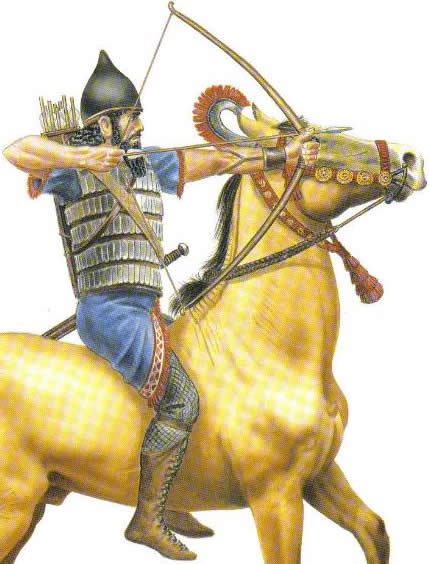 |
Call Vasili at (847) 982-5800
vshoumanov@yahoo.com
A Service of the
Assyrian Academic Society
8324 N. Lincoln Avenue
Skokie, IL 60077 USA |
|
Aprim claims, “Assyrian Christians will be forced to read the Koran in Arabic.” Don’t they already? What about the Chaldean Assyrians and the Suryan Assyrians reading the Bible in Arabic? Does that automatically make them Muslims, or Christian Arabs? In fact, if Assyria is made of Muslim Assyrians, Christian Assyrians, and Jewish Assyrians, not only will all three religions be equal in the eyes of the law, but the Assyrian language will more likely be one of the official languages taught and used in Iraq.
Aprim admits that many of the issues he raises in his article already exist, but insists that “today Assyrian Christians accept the reality on the ground because they are different.” How Assyrian Christians are different than Assyrian Muslims or Assyrian Jews for that matter, Aprim doesn’t tell us. He goes on to say “However, it would be very hard to swallow when an Assyrian Moslem treats Assyrian Christian non-equally.” In a pluralistic society, the odds of an Assyrian Moslem treating an Assyrian Christian or Jew equally are much better than the current odds. The separation and division of religions fuels the hostility between the people’s of the world. Historians have pointed out that the twentieth Century was the bloodiest century in the history of mankind. Religious wars dominated the century, starting with the Turks trying to annihilate the Christian Assyrians and the Armenians, with the help of some Kurds. In 1933, the Iraqi army slaughtered thousands of Christian Assyrians in Simmel. Hitler tried to bake every Jew in Europe and if that wasn’t enough, he went to the Middle East to make sure he got all of them. America went to Korea and Vietnam to contain Communism, or the “Atheist revolution”. After all this, we still have not learned what it takes to love, tolerate, and respect one another.
Even today, the Christian Assyrians call their Muslim counterparts “inferior” because some Muslims do not accept Christ as their savior. For not believing in Muhammed as their savior, the Muslims in turn call the Christian Assyrians “infidels.” The Jews are caught in between, not believing in either.
It will take another two centuries perhaps to get these people to believe in each other and respect one another, if we do not at the least start today, and begin with Assyria. Assyria was the gate of God, and it can be that gateway again.
Let us diffuse the tensions, the hostilities, and the violence by opening up Assyria to whomever wants to be known as an Assyrian. Let us remember the great words of William Saroyan:
“I am thinking of seventy thousand Assyrians, one at a time, alive, a great race. I am thinking of Theodore Badal, himself seventy thousand Assyrians, and seventy million Assyrians, himself Assyria, and man, standing in a barbershop, in San Francisco, in 1933, and being, still himself, the whole race.”
If Assyria is the race of man, then the heart of man is Assyrian, no matter who they are, where they are, and what they believe. If today’s Iraq is Assyria, then whoever lives there is an Assyrian, and therefore, Kurds, Arabs, Armenians, Turkoman, Mandeans, Sabbeans, Yezidis, Chaldeans, and Suryans are all ASSYRIANS.
|
